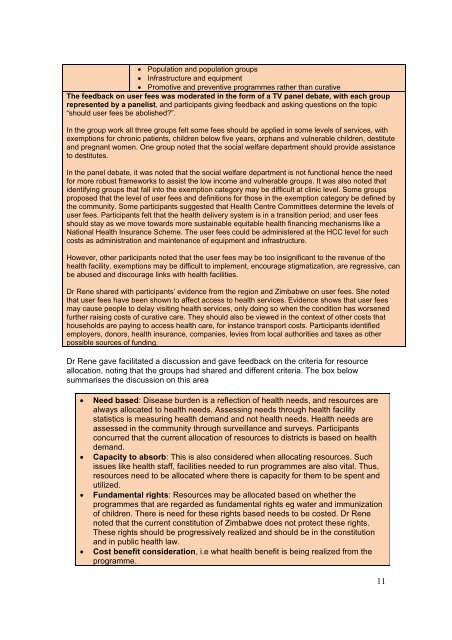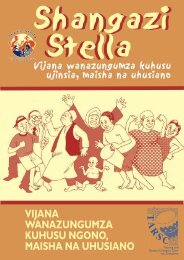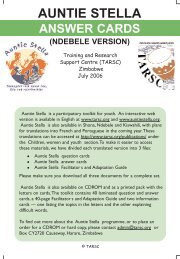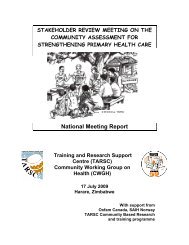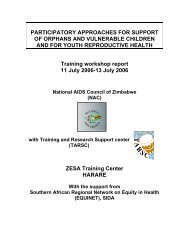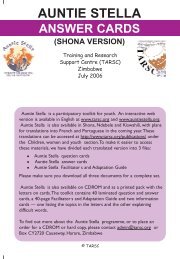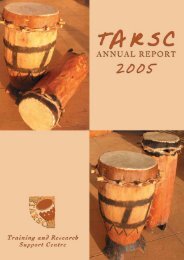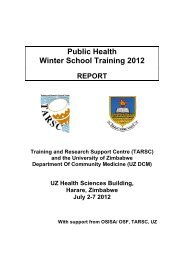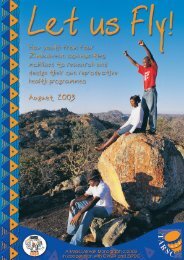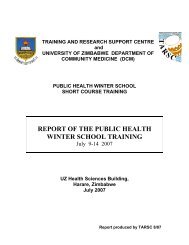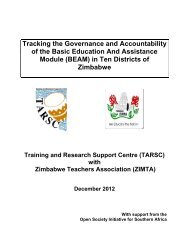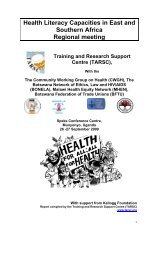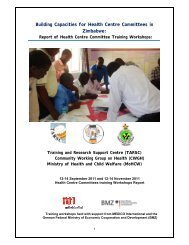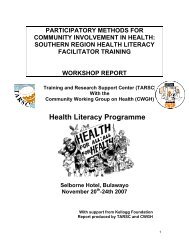WS10 Report.pdf - Training and Research Support Centre
WS10 Report.pdf - Training and Research Support Centre
WS10 Report.pdf - Training and Research Support Centre
Create successful ePaper yourself
Turn your PDF publications into a flip-book with our unique Google optimized e-Paper software.
Population <strong>and</strong> population groups<br />
Infrastructure <strong>and</strong> equipment<br />
Promotive <strong>and</strong> preventive programmes rather than curative<br />
The feedback on user fees was moderated in the form of a TV panel debate, with each group<br />
represented by a panelist, <strong>and</strong> participants giving feedback <strong>and</strong> asking questions on the topic<br />
“should user fees be abolished?”.<br />
In the group work all three groups felt some fees should be applied in some levels of services, with<br />
exemptions for chronic patients, children below five years, orphans <strong>and</strong> vulnerable children, destitute<br />
<strong>and</strong> pregnant women. One group noted that the social welfare department should provide assistance<br />
to destitutes.<br />
In the panel debate, it was noted that the social welfare department is not functional hence the need<br />
for more robust frameworks to assist the low income <strong>and</strong> vulnerable groups. It was also noted that<br />
identifying groups that fall into the exemption category may be difficult at clinic level. Some groups<br />
proposed that the level of user fees <strong>and</strong> definitions for those in the exemption category be defined by<br />
the community. Some participants suggested that Health <strong>Centre</strong> Committees determine the levels of<br />
user fees. Participants felt that the health delivery system is in a transition period; <strong>and</strong> user fees<br />
should stay as we move towards more sustainable equitable health financing mechanisms like a<br />
National Health Insurance Scheme. The user fees could be administered at the HCC level for such<br />
costs as administration <strong>and</strong> maintenance of equipment <strong>and</strong> infrastructure.<br />
However, other participants noted that the user fees may be too insignificant to the revenue of the<br />
health facility, exemptions may be difficult to implement, encourage stigmatization, are regressive, can<br />
be abused <strong>and</strong> discourage links with health facilities.<br />
Dr Rene shared with participants’ evidence from the region <strong>and</strong> Zimbabwe on user fees. She noted<br />
that user fees have been shown to affect access to health services. Evidence shows that user fees<br />
may cause people to delay visiting health services, only doing so when the condition has worsened<br />
further raising costs of curative care. They should also be viewed in the context of other costs that<br />
households are paying to access health care, for instance transport costs. Participants identified<br />
employers, donors, health insurance, companies, levies from local authorities <strong>and</strong> taxes as other<br />
possible sources of funding.<br />
Dr Rene gave facilitated a discussion <strong>and</strong> gave feedback on the criteria for resource<br />
allocation, noting that the groups had shared <strong>and</strong> different criteria. The box below<br />
summarises the discussion on this area<br />
<br />
<br />
<br />
<br />
Need based: Disease burden is a reflection of health needs, <strong>and</strong> resources are<br />
always allocated to health needs. Assessing needs through health facility<br />
statistics is measuring health dem<strong>and</strong> <strong>and</strong> not health needs. Health needs are<br />
assessed in the community through surveillance <strong>and</strong> surveys. Participants<br />
concurred that the current allocation of resources to districts is based on health<br />
dem<strong>and</strong>.<br />
Capacity to absorb: This is also considered when allocating resources. Such<br />
issues like health staff, facilities needed to run programmes are also vital. Thus,<br />
resources need to be allocated where there is capacity for them to be spent <strong>and</strong><br />
utilized.<br />
Fundamental rights: Resources may be allocated based on whether the<br />
programmes that are regarded as fundamental rights eg water <strong>and</strong> immunization<br />
of children. There is need for these rights based needs to be costed. Dr Rene<br />
noted that the current constitution of Zimbabwe does not protect these rights.<br />
These rights should be progressively realized <strong>and</strong> should be in the constitution<br />
<strong>and</strong> in public health law.<br />
Cost benefit consideration, i.e what health benefit is being realized from the<br />
programme.<br />
11


